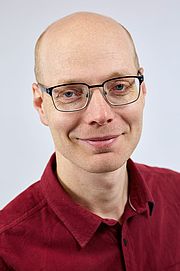With effect from March 1, 2020, Hochschule Geisenheim University has a new Vice-President of Student & Academic Affairs: Professor Alexander von Birgelen. He was elected to the position for a period of three years by an elective assembly composed of the extended Academic Senate on November 19, 2019. Von Birgelen is taking over from Professor Otmar Löhnertz, for whom this "formal office" has come to an end after thirty years of dedication to teaching at Geisenheim, but who intends to continue to work on the continued development of teaching and studies at the University.
Building on past successes and together with employees, von Birgelen is looking to promote Hochschule Geisenheim University, in particular by focusing on the question: "How can we manage to maintain our student numbers and remain attractive as a small, specialized academic location in the future? For an academic location, this consists first and foremost of excellent teaching and this calls for innovation, because teaching at universities is in a constant state of change. These days, it is not only a matter of teaching new specialist knowledge, but also of integrating more methodological knowledge into degree programs," says the new Vice-President of Student & Academic Affairs. He considers digitization to be one of the most important drivers behind innovative teaching going forward, and in this respect he plans to exploit all the potential that is available at Geisenheim. For this reason, support for the testing and development of innovative forms of teaching is high on his agenda, for instance:
- Action-based formats, such as research, problem or project-related learning
- Supporting autonomous learning
- Digital formats, e.g. blended learning arrangements or tools for future digital working environments
- New concepts for learning objectives, teaching/study methods, examination types and content, e.g. in the context of constructive alignment
However, von Birgelen also intends to address such issues as how the 17 degree programs now offered at the internationally oriented University can be made even more attractive, how student performance can be increased without sacrificing standards, always with a view to where continuity can be achieved and where innovation is required.
Hochschule Geisenheim University is looking forward to working with Professor von Birgelen and wishes him every success in his new venture!
Résumé:
Alexander von Birgelen studied Landscape Planning, majoring in Planting Design at the Technical University in Berlin. Following his studies he worked as a freelance landscape designer. In 2008 he co-founded the Berlin planning office Strauchpoeten. From 2006 to 2010 he worked as an academic staff member at the Technical University of Berlin, in the Department of Planting Design and Vegetation Technology. This was followed by a position as deputy professor for planting design at the Technical University of Dresden from 2011 to 2015. In 2014 In 2014 Alexander von Birgelen completed his doctorate at the Technical University of Berlin on the topic: "The Vegetation of Urban Reconstruction Landscapes in Large Housing Estates of the 1970s and 1980s in East Germany - Potential and Limitations of their Open Space Development". In October 2015 he was appointed Professor for Bedding Plant Science and Planting Design at Hochschule Geisenheim University and Head of the maintenance and development of the University's parks. Alexander von Birgelen has been involved in the Germany-wide Working Group on Planting Design since 2005.





![to campus south;; M. Faust 2023 [Translate to English:] Bild Unter Campus](/fileadmin/_processed_/6/9/csm_MF_HEADER_UNTERERCAMPUS_b3323b9354.jpg)



